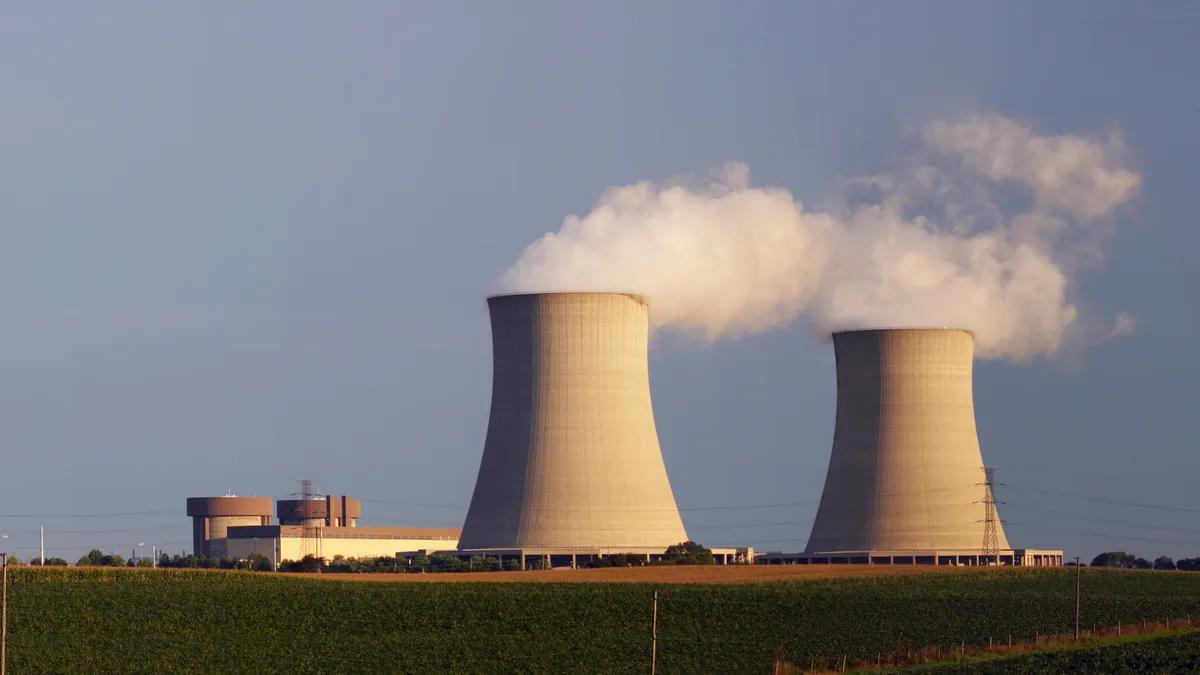Dive Brief:
- The Illinois Senate voted early Wednesday morning to approve a sweeping energy bill that would decarbonize the electric grid of one of the largest states in the country by 2050.
- Senate Bill 18 provides hundreds of millions in subsidies to keep the state's nuclear power sector open, with Exelon preparing to shut down its Byron nuclear plant Sept. 13.
- But the legislation, which still needs to pass the House, faces 11th hour hurdles: Gov. J.B. Pritzker, D, is raising objections to a key part of the plan dealing with the large Prairie State coal-fired plant.
Dive Insight:
The Illinois Senate's clean energy package provides more than $600 million in subsidies for renewable power-related initiatives, and nearly $700 million over five years for the state's struggling nuclear power sector.
However, Illinois' governor has raised objections to a key piece of the deal, which would require the municipally-owned Prairie State coal-fired plant, the largest carbon emitting power plant in Illinois and one of the largest in the nation, to shut down by 2045.
Pritzker is all in favor of the shutdown, but he wants to see the plant forced to reduce emissions as well before it closes, according to a tweet from the governor's office shortly after the Senate bill passed.
The governor's objections raise the prospect of legislative negotiations going down to the wire, with roughly 10 days, or even less, for a final bill to get passed before Exelon moves ahead with its closure plans.
"The clock is our enemy and there is still a lot to do," said James Hopf, policy lead at Generation Atomic. "They have to move with alacrity."
Exelon, which owns six nuclear plants in the state, has said it plans to close its Byron plant on Sept. 13 unless the bill passes.
But the real deadline is even tighter than that, with the legislation needing to clear before Sept. 13 in order to keep the plant open, Exelon noted in a statement.
Exelon is in the midst of preparing for the retirement of two of its Illinois nuclear plants, Byron and Dresden, a major undertaking, a spokesperson indicated. However, the company has "established off-ramps" that will allow contingencies for continuing operations if legislation is passed "with enough time for us to safely refuel the plants," an Exelon spokesperson said in an email.
"To be clear, Byron will run out of fuel and will permanently shut down on September 13 unless legislation is enacted," the spokesperson stated. "We have been clear that we cannot refuel Byron on September 13 or Dresden in November absent policy changes."
Jack Darin, head of Sierra Club's Illinois chapter, also acknowledged the tightness of the deadline, but said it is important the final bill require the Prairie State coal-fired plant to also reduce its emissions before it closes.
"That is what really needs to be fixed — we are optimistic it can be done," Darin said. "We are at decision time. We have a governor leading on climate change. We need the Illinois House to seize the moment."
Still, David Kolata, executive director of the Citizens Utility Board in Illinois, expressed concern about the potential ramifications for the state's decarbonization plans should Exelon be forced to start closing its nuclear plants.
Nuclear plants currently produce more than 50% of Illinois' electric power.
"I think the big deadline here is the closure date of Byron," Kolata said. "That is an enormous part of the overall structure here. It will be very difficult for Illinois to meet our climate goals if nuclear plants close prematurely and needlessly."














